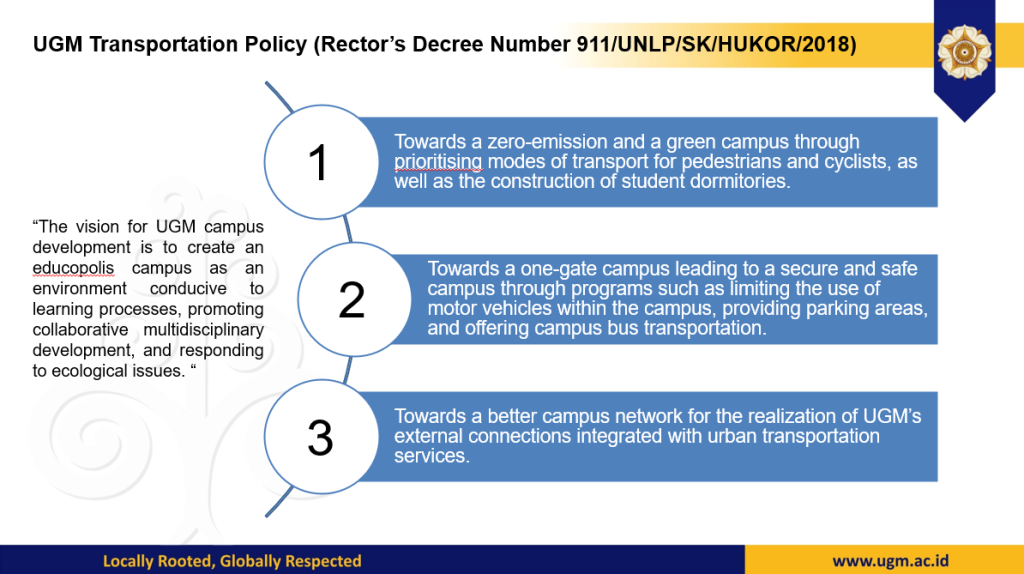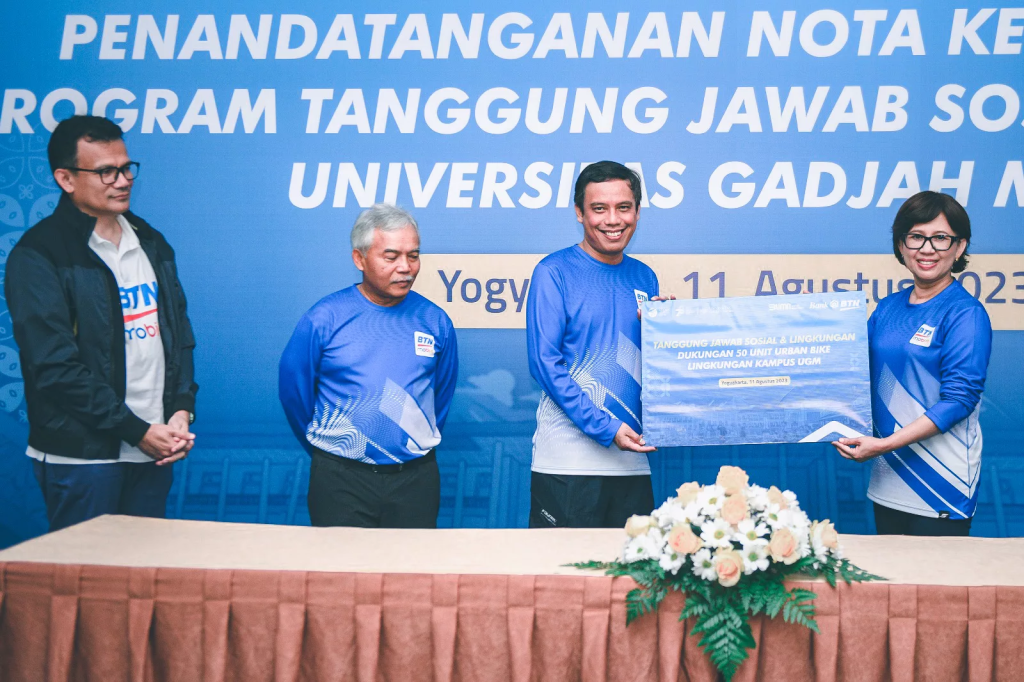The university has implemented several measures and set specific targets to encourage the use of non-motorized and eco-friendly transportation modes. UGM has established policies to guide sustainable transportation within the campus. Notably, Rector’s Decree Number 911/UNLP/SK/HUKOR/2018 outlines transportation guidelines aimed at reducing carbon emissions and promoting environmentally friendly commuting options.

The total number of Zero Emission Vehicles (ZEV) in UGM in 2023 has increased significantly compared to 2022 by around 5.34%, specifically, the number of electric buses has more than doubled, along with an additional 47 electric motorcycles.

UGM now has a total of five buses in the Electric Bus fleet. Three buses are a recent donation from the Indonesian Ministry of Investment. The Electric Bus Service at UGM, known as Trans Gadjah Mada, is a convenient and eco-friendly mode of transportation offered on campus. Previously, only two electric buses were available, but the Indonesian Ministry of Investment recently added 3 more buses to the fleet. These buses operate from Monday to Friday from 06.30 a.m. to 4.16 p.m. within a determined route and are free to use by both staff and students, making it a sustainable option for commuting around campus. With more buses in the fleet, the intervals between bus arrivals can be shortened, encouraging more people to use the bus. The electric bus can accommodate approximately 74.26% of the UGM population annually. Operational hours and information regarding the Trans Gadjah Mada electric bus service can be monitored through the Trans Gadjah Mada application.


The number of electric motorcycles available to use in UGM has also increased significantly from 47 units in 2022 to 52 units in 2023. These motorcycles are a donation from PT Volta Indonesia Semesta, a company based in Semarang that specialises in electric vehicle technology. Together, PT Volta and UGM have signed an MoU agreeing to collaborate on green technology research.


The staff of UGM work units use electric motorcycles to commute around campus
UGM has a total of 8 electric shuttles. The UGM Electric Shuttle is an eco-friendly transportation method, especially for those with disabilities. University Guests may also use them to get to and from the Central UGM Building and around the UGM campus. The shuttle service has three different shuttles based on capacity: small, medium, and large. The UGM Electric Shuttle Service has 3 sizes of shuttles: the small-sized shuttle, which seats four people, the medium-sized shuttle, which seats six people, and the large-sized shuttle, which seats ten people. This variety in shuttle sizes allows UGM to meet the transportation needs of different group sizes efficiently.



The small-sized, medium-sized, and large-sized electric shuttles on campus
Apart from using ZEVs, UGM also offers the “Free Bikes for Rent” program. Campus bicycles are available for staff and students to rent at no cost. UGM has over 1,000 bikes that have been donated by several Indonesian state-owned enterprises and private industries (such as Bank Nasional Indonesia (BNI) and Bank Tabungan Negara (BTN).


The ‘Free Bikes for Rent’ program has been advertised on many campus social media, websites, and posters (see https://sepedakampus.ugm.ac.id/). Students and staff who wish to rent a bike must follow certain procedures and notify the officer in charge at the bicycle station. In addition to bicycle stations for renting campus bikes, UGM also provides bicycle shelters that are strategically placed at various locations within campus to provide convenient and secure parking. These shelters serve not only for rented bikes but also for parking personal bikes. Thus, the campus community should be encouraged to use zero-emission vehicles rather than carbon-emission ones.



Bike station locations and the rental location
To assess the effectiveness of these initiatives, UGM employs ICT-based monitoring systems that track the usage of bicycles and electric buses. Data collected includes the number of users, frequency of use, and overall reduction in carbon emissions. This information is crucial for evaluating progress toward sustainability targets and identifying areas for improvement.
Through these comprehensive measures, UGM demonstrates a proactive approach to fostering sustainable commuting practices, aligning with its broader commitment to environmental stewardship and the achievement of the SDGs.
References:
- Rector’s Decree Number 911/UNLP/SK/HUKOR/2018
- UGM now has a total of five buses in the Electric Bus fleet
- Trans Gadjah Mada
- Trans Gadjah Mada application
- Electric Motorbike from PT Volta Indonesia Semesta for UGM
- BNI Donates 100 Bicycles to Support Smart Mobility at UGM
- Bank BTN donates 50 bicycles to UGM
- https://sepedakampus.ugm.ac.id/
